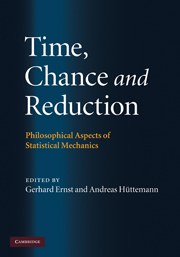Book contents
2 - Does a low-entropy constraint prevent us from influencing the past?
from Part I - The arrows of time
Published online by Cambridge University Press: 04 August 2010
Summary
Introduction
It is part of our common sense conception of the world that what happens now can make a difference to the future but not to the past; events in the present, we believe, can causally influence the occurrence of future events but not of past events. What is the relation between this asymmetry and other physical asymmetries? Is the causal asymmetry fundamental or can our asymmetric notion of cause be shown to be reducible to some other physical asymmetry? There is a venerable tradition in the foundations of physics and the philosophy of science according to which the causal asymmetry is intimately related to the temporal asymmetry embodied in the second law of thermodynamics. This view has recently been forcefully defended by David Albert (2000) and by Barry Loewer (2007), who argue that the causal asymmetry can ultimately be grounded in the very same facts that give rise to the second law of thermodynamics, chiefly among them a low-entropy constraint on the initial state of the universe.
In this chapter I will critically examine aspects of their accounts and will argue that neither account is successful as developed so far. In Section 2.2 I will briefly summarize the Boltzmannian account of the thermodynamic asymmetry, from which Albert and Loewer aim to derive asymmetries of causal influence and control. Both accounts centrally involve the claim that it follows from the Boltzmannian account that possible macro-evolutions are much more restricted toward the past than toward the future.
- Type
- Chapter
- Information
- Time, Chance, and ReductionPhilosophical Aspects of Statistical Mechanics, pp. 13 - 33Publisher: Cambridge University PressPrint publication year: 2010
References
- 11
- Cited by



